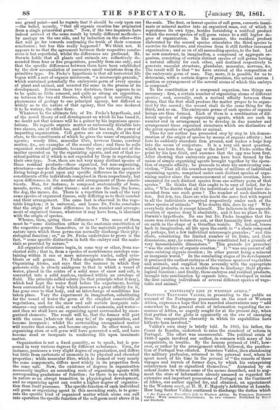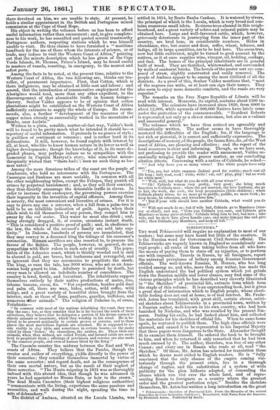A TRAVELLER'S LIFE IN WESTERN AFRICA.* FBA:Nasal TRATASSOS VALDEZ, in
presenting to the public an account of the Portuguese possessions on the coast of Western Africa, expresses a hope that his recorded observations may " add somewhat to the general stock of information regarding the re- sources of Africa, so eagerly sought for at the present day, when that portion of the globe is apparently on the eve of emerging from the comparative obscurity in which its capabilities hays hitherto been involved."
Valdez'a own story is briefly told. In 1844, his father, the Count de Bonifim, undertook to raise the standard of reform in Portugal. The effort was unsuccessful. The political crisis of 1846-7 again involved our author, in common with many of his compatriots, in trouble. By the famous protocol of 1847, how- ever, or rather by the arrangement which followed, the pacifica- tion of Portugal was effected. Francisco Valdez, then abandoning the military profession, returned to the paternal roof, where he spent much of his time in the perusal of "the records of those voyages and travels of former days, by which his enterprising countrymen had so signalized themselves." Animated by an ardent desire to witness some of the scenes described, and to aug- ment the store of information already amassed as regarded the extensive and important possessions of Portugal on the Continent of Africa, our author applied for, and obtained, an appointment to the Western coast, as H. M. F. Majesty's Arbitrator at Loanda. How long Senhor Valdez continued to discharge the duties which
• Six Years of a Traveller's Life in Western Africa. By Francisco Travassos
Valdez. With numerous Illustrations. In two volumes. Published by Hunt and Blackett.
there devolved on him, we are unable to state. At present, he holds a similar appointment in the British and Portuguese mixed commission at the Cape of Good Hope. His object in writing the volumes before us has been to afford useful information rather than amusement ; and, to give complete- ness to his work, he has consulted and quoted several trustworthy Portuguese authors, respecting stations which he was himself unable to visit. He thus claims to have furnished a " maritime handbook for the use of those whom the interests of science, or of trade, may induce to visit the Western Coast of Africa," pointing out that the minute description which he has given of the Cape Verde Islands, St. Thomas, Prince's Island, may be found useful to masters of vessels, resorting, in emergency, to the nearest and safest ports.
Among the facts to be noted, at the present time, relative to the Western Coast of Africa, the two following are, thinks our tra- veller, of paramount importance. First, that Cotton, which is there indigenous, may be obtained at little cost and labour ; and second, that the introduction of remunerative employment for the Aborigines would tend, more than any other expedient, to the discouragement of that abominable traffic in human beings— Slavery. Senhor Valdez appears to be of opinion that cotton plantations might be established on the Western Coast of Africa sufficiently extensive to supply the whole of Europe. He recom- mends, also a further " development of the resources of the copper mines already so successfully worked in the mountains of Bembe, near Ambriz. '
Written in a plain, sensible, matter-of-fact way, Valdez's book will be found to be pretty much what he intended it should be—a repertory of useful information. It pretends to no graces of style ; is guiltless of sentiment or romance ; and is rather hard in its delineations. It will, however, be found replete with interest by all, at least, who like to know human nature in its lower as well as higher developments; though the knowledge of it, in its more de- graded phases, may perhaps induce us to sympathize with the humourist in Captain Marryat's story, who somewhat misan- thropically wished that "there hadn't been no such thing as hu- man natur."
Among the more ferocious tribes of the coast are the people of Jambarein, who hold no intercourse with the Portuguese. The Cassangas and Banhuas are more sociable. In common with all the other neighbouring tribes, except the Felupes, they punish all crimes by perpetual banishment ; and, as they sell their convicts, they thus directly encourage the detestable traffic in slaves. In order to increase their exchequer, the governing powers exercise their ingenuity in the invention of capital offences. Among these is sorcery, the most convenient and lucrative of crimes. For it is easy to prove any one a sorcerer, when a fall from a palm-tree is held to be an infallible indication of guilt. Again, when their , chiefs wish to rid themselves of any person, they compel him to swear by the red water. This water he must also drink ; and, being strongly drugged, it, of course, occasions instant death. " This is considered a positive proof of guilt; and, in obedience to the law, the whole of the accused's family are sold into cap- tivity." In Dahome, hundreds of persons are immolated, that they may convey to a deceased king the tidings of his successor's coronation, Human sacrifices are also resorted to, to procure the favour of the deities. The people, however, in general, do not sympathize with their rulers in such ants of cruelty. The popu- lation of the Ashantee coast, which is thickly wooded and is said to abound in gold, are brave, but barbarous and revengeful, and so ignorant that they use ceremonies to propitiate the shark. The king, so runs the tale, has 3000 wives, who act as an Ama- zonian body guard to him. Adultery is punished by death, but i every man is allowed an indefinite number of concubines. The country is level, fertile, and luxuriant. The inhabitants support themselves entirely by their native productions of maize, rice, inhame banana, cocoa, &o. " For exportation, besides gold dust and palm oil, there are wax, hides, cotton, wild coffee, wild indigo, and a great variety of beautiful skins brought from the interior, such as those of lions, panthers, gazelles, buffaloes, and numerous other animals." The religion of Dahome is, of cone, Fetichistio- " In common with most of the nations inhabiting the coast, they wor- ship the sun ; but, as they consider that he is far beyond the reach of their adorations, they believe that he delegates a portion of his divine essence to objects animate or inanimate, which they worship in his stead. He is be- lieved to be present spiritually in certain groves or caverns, and to these places the most marvellous legends are attached. He is supposed to re- side visibly in clay idols, and sometimes in certain beasts—as the snake called by them Dabor,' the chameleon, the urubus, &c. These idols and animals, when thus defined, are called Fetish, and horned cattle are sacri ficed to propitiate them ; offerings of provisions and cowries are also made by the common people, and even of human blood by the Bing."
The Cazembe country lies midway between the East and West coasts of Africa. They believe that the Pambe, though the creator and author of everything, yields directly to the power of their sorceries ; they consider themselves immortal by virtue of the same soroeries ; and regard death, not as the consequence of their own mortal nature, but as the result of their neglect of these sorceries. " The Muata reigning in 1831 was so thoroughly imbued with this absurd idea, that though he was advanced in years he had appointed no Mnano Buto, or heir to the crown." The dead Muata Cazembes (their highest religious authorities) "communicate with the living, experience the same passions and necessities, and walk during the night, spending the time in acts of debauchery." The district of Ambaca, situated on the Lucala Llamba, was settled in 1614, by Bento Banha Cardoso. It is watered by rivers, the principal of which is the Lucala, which is very broad and con- tains numerous small islets. Resinous trees abound in this neigh- bourhood, and a great variety of ochres and mineral paints may be obtained here. Large and well-favoured cattle, which, however, grievously deteriorate in journeying from the inner part of the country, are bred here, in considerable numbers. Hides in abundance, rice, but scarce and dear, coffee, wheat, tobacco, and indigo, all in large quantities, are to be had here. The cocoa tree, now but little cultivated, might be turned to good account by the
natives, as it at once supplies wine, vinegar, oil, bedding, cordage, and fuel. The homes of the principal inhabitants are in general
built of wood. They are thatched, whitewashed, and surrounded
by walls of sunburnt bricks. The hovels of the poorer sort are com- posed of straw, slightly constructed and easily. removed. The
people of Ambaca appear to be among the most civilized of all the districts. As a proof of this, Senhor Valdez mentions that, "most of the negroes can write, or at least can sign their names. They also seem to enjoy more domestic comforts, and the roads are very superior." The remarks on the Free Negro Republic of Liberia will be read with interest. Monrovia, its capital, contains about 2500 in- habitants. The colonists have increased since 1820, from 6000 to about 12,000, while upwards of 300,000 Natives have lately come under the protection of the commonwealth. "Resident Roberts is represented not only as a clever statesman, but also as a valiant and successful general." The volumes which we have thus noticed are agreeably and idiomatically written. The author seems to have thoroughly mastered the difficulties of the English; for, if the language is not rich or pictorial, it is correct and sufficiently expressive. The descriptions of scenery,of the people, the fauna flora, &o.,of the West coast of Africa, are pleasing and effective ; and the report of the local resources is clear and informing. Though, as we have seen, not professing to provide the reader with amusement, Valdez oc-
casionally mingles light with graver matter, as our concluding citation attests. Conversing with a native of Cabinda, he asked- " And why have you so many wives ? The white people have only one.'
"'Yes, yes, but white enganas (ladies) good for nuttin ; much cost all life long ; only read, read ! write, write! eat, eat ! play, play ! but no work for white men.'
" Well, well, but what do you do with all your wives ? '
" Oh ! Cabinda woman very pretty, very good ; she bring much bracelets to Cabinda man : when she get married, she love husband, she go to hut, she work, she cook, she keep pequeninies (little children) ; when Cabinda plenty wives, he no more go to paddle, paddle, no more work ; he keep house, he tobaccoes, and wives love him.'
But if your wife should love another Cabinda, what would you do then ?'
" Wife not much do so ; but if wife bad, Cabinda go to Mambuco (vice- roy or chief), and say, " Give you Cabinda you cane, and Cabinda give Mambuco so many piece of cloth : Cabinda bring him to bad, bad man ; take wife, and he show him silver handle cane, and make him pay fine and give wife; then Cabinda pay Mambuco, and keep all left." ' "



























 Previous page
Previous page